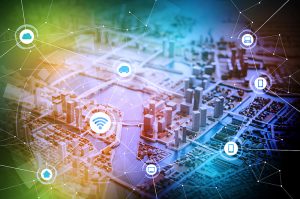
Why should your business take fleet safety seriously?
March 21, 2018
The future of trucking in blockchain. Are you ready?
May 8, 2018The Internet of Things (IoT) continues to be a buzzworthy topic that remains unclear to many. But the more IoT relates to our homes and everyday lives – including the industries in which we work – the more we need to pay attention to this phenomenon.
Infoworld.com provides one of the simpler explanations of the Internet of Things that we’ve seen. The tech website says that IoT is “an environment that gathers information from multiple devices (computers vehicles, smartphones, traffic lights, and almost anything with a sensor) and applications (anything from a social media app such as Twitter to an e-commerce platform, from a manufacturing system to a traffic control system).”
In IoT, “Internet” refers to a network or the internet, and “Things” refers to any physical “thing” that exists in the world, from appliances to objects to people. When the two are connected via sensors and unique identifiers, we can extract meaningful information.

For example, the Nest thermostat is a “smart” thermostat that learns the owner’s behaviours and, after time, sets temperatures based on that data – along with information collected from sensors as to whether the owner is home or not. With the Nest app, owners can adjust temperatures from a device anytime, anywhere.
When we talk about the Internet of Things in relation to fleet management, the “things” are vehicles and the people who drive them. When vehicles are given sensors, we can manage and control them through web applications. With Roadnet’s MobileCast, GPS technology gives transportation managers real-time information about routes and drivers. So, while a homeowner could use the Nest app to see if the thermostat is pumping costly heat when he or she is away from home, a transportation manager could use the MobileCast app to check in on drivers and make sure trucks are on time and not making costly off-route stops. Both the homeowner and the transportation manager can get this information from their smartphones, no matter how far away they are from the action.
Telematics solution also applies to the Internet of Things. Telematics devices installed in trucks can give managers insight into driver behaviour, adherence to laws, speeding, idling, and more. The telematics device is the sensor that detects and communicates information.
Before goods are even put onto trucks, they too relate to the Internet of Things. Logistics managers are using RFID technology to chip pallets in order to control and track products. An article from Inboundlogistics.com says that cloud-based GPS and RFID technologies are “the backbone of IoT as it relates to the supply chain.”
Before long, the Internet of Things will be a huge part of our daily lives. In the transportation world, this is good news for managers. The more technology advances, the more meaningful data can be collected about operations so that improvements can be made.
Republished with permission from Omnitracs.
At Market Motion, we are committed to using the latest technology to arm our clients with as much data about their operations as possible. Call us on 1300 558 381 to discuss.
About us
Market Motion provide fleet management solutions, strategic consulting and software implementation. We work with you to grow your business, reduce your fleet costs, improve safety and customer satisfaction while giving you greater control and visibility into your operations.

